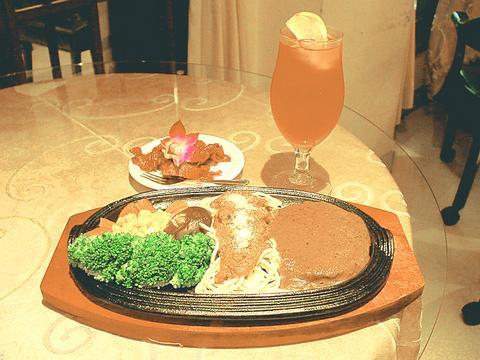Vegetarians in Taipei have no trouble finding nice restaurants to eat at. However, since the majority of people in Taiwan eat vegetarian food as a form of religious observance, most vegetarian restaurants provide only Asian food and some play overtly religious music.
The Yu family, long-time vegetarians themselves, noticed the monotony and set up Vegetarian Gourmet to provide an alternative. It has been open five years and remains one of a very small number of non-Asian vegetarian restaurants in town.

PHOTO: VICO LEE, TAIPEI TIMES
The restaurant is located in a quiet alley conveniently close to the Kungkuan MRT station. Its proximity to the National Taiwan University and National Taiwan Normal University explains why it's often full of 20-somethings with backpacks and Chinese-speaking foreigners.
Vegetarian Gourmet's menu looks not much different from those of non-vegetarian restaurants. Steak with black pepper sauce, steak with mushrooms, cod steak, ham and shrimp are just a few examples.
But don't be fooled. These are actually imitation meat made with konjac or beans. All dishes are prepared without eggs but some include dairy products. Although these products are slightly more expensive than real meat, their taste and aroma is similar to beef or pork, but they don't leave you with the heaviness of a meat meal.
The seafood roast with cheese (NT$280 alone or NT$550 for a set) is a popular dish that looks and tastes exactly like its non-vegetarian counterpart.
The chewy cubes of "squid" and slices of shrimp are made of konjac. The seafood flavor comes from a meticulously prepared sauce that is a blend of several spices. Pastas are also popular and the restaurant has several kinds on offer, including the healthy and light lasagna with spinach.
Fruit vinegar is a Vegetarian Gourmet speciality. The home-made fruit vinegar (NT$160) takes two to three months to brew and has a lingering aroma. The first taste may be a little too pungent for first-timers, but when you get used to it, its as smooth as a fine wine.
Afternoon teas (NT$150 including one serving of vegetable cake) are also available on weekends. There is a wide range of drinks, from a variety of coffees (with one refill) to smoothies, yogurt drinks and hot teas.

June 9 to June 15 A photo of two men riding trendy high-wheel Penny-Farthing bicycles past a Qing Dynasty gate aptly captures the essence of Taipei in 1897 — a newly colonized city on the cusp of great change. The Japanese began making significant modifications to the cityscape in 1899, tearing down Qing-era structures, widening boulevards and installing Western-style infrastructure and buildings. The photographer, Minosuke Imamura, only spent a year in Taiwan as a cartographer for the governor-general’s office, but he left behind a treasure trove of 130 images showing life at the onset of Japanese rule, spanning July 1897 to

One of the most important gripes that Taiwanese have about the Democratic Progressive Party (DPP) is that it has failed to deliver concretely on higher wages, housing prices and other bread-and-butter issues. The parallel complaint is that the DPP cares only about glamor issues, such as removing markers of Chinese Nationalist Party (KMT) colonialism by renaming them, or what the KMT codes as “de-Sinification.” Once again, as a critical election looms, the DPP is presenting evidence for that charge. The KMT was quick to jump on the recent proposal of the Ministry of the Interior (MOI) to rename roads that symbolize

On the evening of June 1, Control Yuan Secretary-General Lee Chun-yi (李俊俋) apologized and resigned in disgrace. His crime was instructing his driver to use a Control Yuan vehicle to transport his dog to a pet grooming salon. The Control Yuan is the government branch that investigates, audits and impeaches government officials for, among other things, misuse of government funds, so his misuse of a government vehicle was highly inappropriate. If this story were told to anyone living in the golden era of swaggering gangsters, flashy nouveau riche businessmen, and corrupt “black gold” politics of the 1980s and 1990s, they would have laughed.

It was just before 6am on a sunny November morning and I could hardly contain my excitement as I arrived at the wharf where I would catch the boat to one of Penghu’s most difficult-to-access islands, a trip that had been on my list for nearly a decade. Little did I know, my dream would soon be crushed. Unsure about which boat was heading to Huayu (花嶼), I found someone who appeared to be a local and asked if this was the right place to wait. “Oh, the boat to Huayu’s been canceled today,” she told me. I couldn’t believe my ears. Surely,